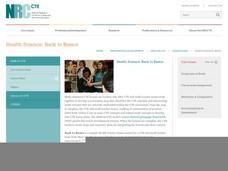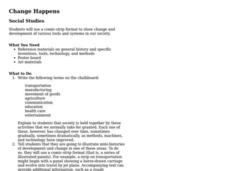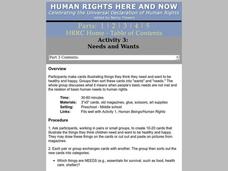National Research Center for Career and Technical Education
Health Science: Back to Basics
This lesson focuses on unit conversion, proportions, ratios, exponents, and the metric system. Discuss measurement with your math class and demonstrate how to solve several health-science word problems. Give learners a chance to visit an...
Curated OER
Human Population's Response to Re-emerging and Emerging Infectious Diseases
Students examine the human population response to microbial diseases. In this disease lesson students observe population trends, write about a scientist and evaluate and defend current treatments for infectious diseases.
Curated OER
"Getting Away with Torture?"
Learners discuss what they know about the abuse of Iraqi prisoners at Abu Ghraib. They research policy memos and assess their influence on military personnel. They identify the Geneva Conventions rule on the treatment of prisoners as well.
Curated OER
Inventors & Trailblazers
Students are introduced to a groups of African American inventors. In groups, they research the role of each person in improving different industries. They also examine the barriers African Americans faced from the Civil War to the...
Curated OER
Medicine, Technology and Society
Students compare and contrast traditional Chinese and contemporary Western approaches to medicine. They bring a rational and scientific approach to the evaluation of alternative medicines. They study acupuncture from a Chinese and...
Curated OER
Fighting the War in Your Head
Students analyze the experiences of a fictional soldier in a war and create a mental health profile for that individual. They emulate psychiatrists and propose treatment strategies for their particular soldier's post-traumatic stress...
Curated OER
Medical Mysteries
Use the theme of medical mystery to engage high schoolers in analyzing the influence of culture, media, technology, and other factors on health. They will explore problem solving and mystery diseases as they practice and improve public...
Curated OER
Cuba On My Mind
Students explore the Cuban society, politics, culture, and economy. As a class, they take a look at the Bush administrations policy on Cuba after reading "Embargo Remains Until Cuba Alters Policy, Bush Says" from The New York Times....
Curated OER
What Makes a Hero?
Students identify the characteristics of a hero. In this character development and writing lesson, students listen to music with a hero theme and discuss the common traits of heroes. Students explore individuals and charitable...
Curated OER
Persuasion and Political Debate by PBS
Students examine rhetorical strategies. In this political debate lesson plan, students research issues of presidential campaigns and deliver persuasive speeches about the issues they research. Students then participate in debates based...
Curated OER
The Tank Man
Young scholars explore the events surrounding the confrontation at Tiananmen Square between Chinese forces and "The Tank Man." They discover how censorship affects what the media reports and what the public learns. Students research...
Curated OER
Comparing Foundations of Democracy
Students examine democratic values. In this democratic ideologies instructional activity, students discuss individual rights and rights of the group. Students also discuss the implications of the priorities made in democratic societies...
Curated OER
Change Happens
Students research different inventions that have changed over time. They use a comic strip format to illustrate how an area has changed. They share their comic strips with the rest of the class.
Curated OER
Self-Assessment
Students take a personal inventory about behaviors. They determine if there are risky behaviors present that could be harmful. The inventory is used to help students examine how to make healthy decisions.
Curated OER
Your Role as a Taxpayer: Why Pay Taxes?
Students evaluate the basic rationale, nature, and consequences fo taxes. They describe why governments need taxes as revenue to provide goods and servicesin this series of activities.
Curated OER
When One Beat Is Better Than Two
Fourth graders create an individualized wellness plan that addresses these controllable health risk factors:obesity, high cholesterol level, high blood pressure and inactivity.
Curated OER
What is Physical Activity?
Learners explore the functions of the heart and how it needs to work hard and rest. They play the "Wise Owl Says" game.
Curated OER
How Do You Choose a Physical Activity?
Students analyze the fitness choices that they make and the benefits of a regular exercise program. They create a sample episode of an original fitness program.
Curated OER
Impact of the End of World War II on Japan
Ninth graders examine and discuss reasons United States occupied Japan after surrender in World War II, view photographs of Japan at end of War and explore how U.S. occupation affected Japan's political, economic, and social systems, and...
Curated OER
Needs And Wants
Students make cards illustrating things they think they need and want to be healthy and happy. Groups then sort these cards into "wants" and "needs." The whole class discusses what it means when people's basic needs are not met and the...
Curated OER
The Millennium Promise in Africa
Pupils compete activities related to the viewing of a documentary film. After viewing the documentary, The Dairy of Angelina Jolie and Dr. Jeffrey Sachs in Africa, students participate in a discussion of the leading factors leading to...
Curated OER
Libby, Montana: Raise Awareness About Potentially Dangerouss Attic Insulation
Students watch a film about the town of Libby, Montana and how they were exposed to attic insulation that contained asbestos. Using the internet, they research the Environmental Protection Agency's guidelines for this type of insulation...
Curated OER
Activity Log- Heart Power
In this health and fitness worksheet, students keep a detailed log on this blank chart. Students record all their fitness activities for a week and indicate if they are aerobic or anaerobic.
Curated OER
Heart Word Game
In this heart health crossword, students locate 14 words to solve clues and place them in the puzzle. Although this appears to be part of a heart health adult presentation, older students could benefit.

























